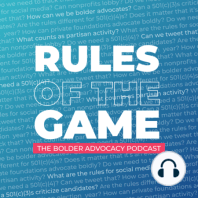15 min listen

Nonprofit New Year's Resolutions
Nonprofit New Year's Resolutions
ratings:
Length:
16 minutes
Released:
Dec 27, 2023
Format:
Podcast episode
Description
On this episode, we’re going to talk about those pesky new year’s resolutions… and no, we’re not talking about signing up for a gym membership or signing up for a marathon. We’re talking about resolutions that nonprofit organizations can apply as we enter into the year 2024. As you all know, 2024 is like Stefon from SNL, it has everything…primaries, general elections, an additional day… So as you are headed for your holiday break, we wanted to leave you with a list of things your nonprofit organization can do as we head into the new year. AFJ Team Members on this Episode: Natalie Ossenfort Monika Graham Victor Rivera On this Episode: Top ten things your nonprofit organization can do to maximize its advocacy in 2024: [drumroll] Host an elections training for staff ahead of the 2024 primaries and general election. Remember that while 501(c)(3)s are not permitted to support or oppose candidates for public office, they CAN engage in nonpartisan election-related activities. Bolder Advocacy can help you navigate the do’s and don’ts with an elections workshop. Request a private workshop through our website or check out one of our many 2024 public webinars. Consider organizing a GOTV campaign or voter registration drive. Check voter registration deadlines that apply to primaries and general election. Brush up on your state’s voter engagement and registration laws. Check out our Practical Guidance – Voter Assistance series, created in partnership with The Democracy Capacity Project. Remember that all 501(c)(3) voter registration efforts must be nonpartisan. Prepare staff and volunteers to NOT answer the question: “Who should I vote for?” Offer services to all. Avoid partisan targeting. Invite members of your coalition to participate in a voter education campaign, which could include a nonpartisan candidate questionnaire and/or voter guide. Guidelines for creating 501(c)(3) safe candidate questionnaires and voter guides include: Use unbiased, open-ended questions (distributed to ALL candidates). Cover a broad range of issues. You’ll also want to avoid comparing your organization’s position on an issue to where candidates stand. Publish all responses impartially and equally (with no editing or variations in font, formatting, etc.), and make the final guide generally available to the public. Remember NOT to include candidate pledges. Also, do not coordinate with candidates and campaigns. Just remember, facts and circumstances matter, so consult with Counsel if you have any questions regarding your specific voter education activities. Organize events inviting public officials to speak during election season. Remember to make the distinction between a candidate appearance and an incumbent appearance. Candidate appearances: must invite all viable candidates, avoid expressing support or opposition for candidate, do not allow candidate fundraising, and ensure compliance with state and federal election laws. Policymaker appearances (in official capacity, unrelated to candidacy): No equal opportunity required, but make sure you’re working with official staff (not campaign staff) and that you reiterate to the incumbent and their staff in writing that you are a 501(c)(3) that is not allowed to support or oppose candidates. Incumbents who are also candidates should not mention their candidacy at your event. And you should also avoid speaking to their upcoming election and focus, instead, on their official acts as policymakers. If you are a 501c4, consider making independent expenditures or coming up with a list of endorsements. 501(c)(4)s can engage in partisan political activity as a secondary activity of the organization, but they are prohibited from making candidate contributions and coordinating activities with federal candidates and campaigns (under federal election law) and are oftentimes subject to similar prohibitions at the state and local level. IE’s and other partisan activity may trigger campa
Released:
Dec 27, 2023
Format:
Podcast episode
Titles in the series (98)
Advocacy to Newly Elected Officials by Rules of the Game: The Bolder Advocacy Podcast